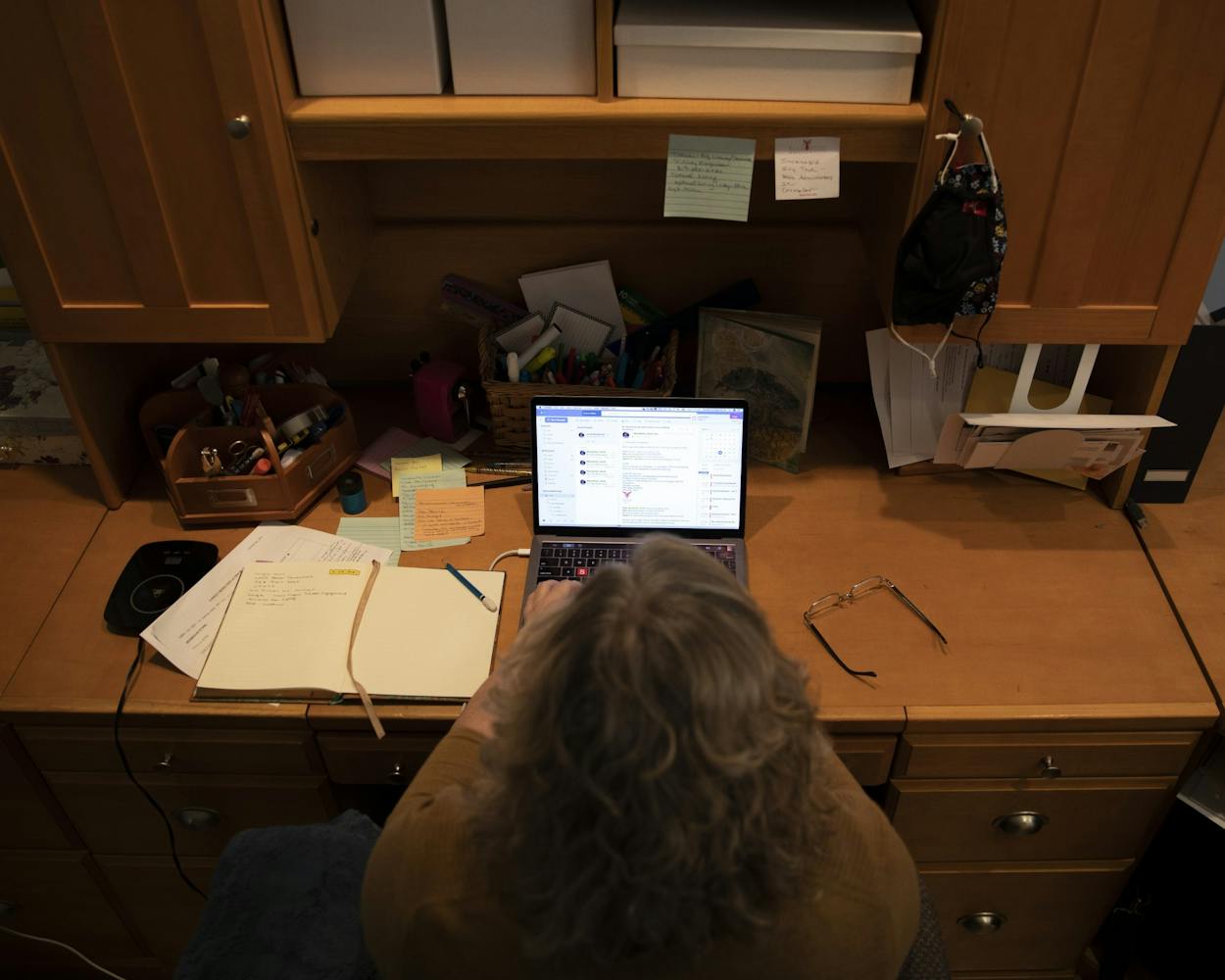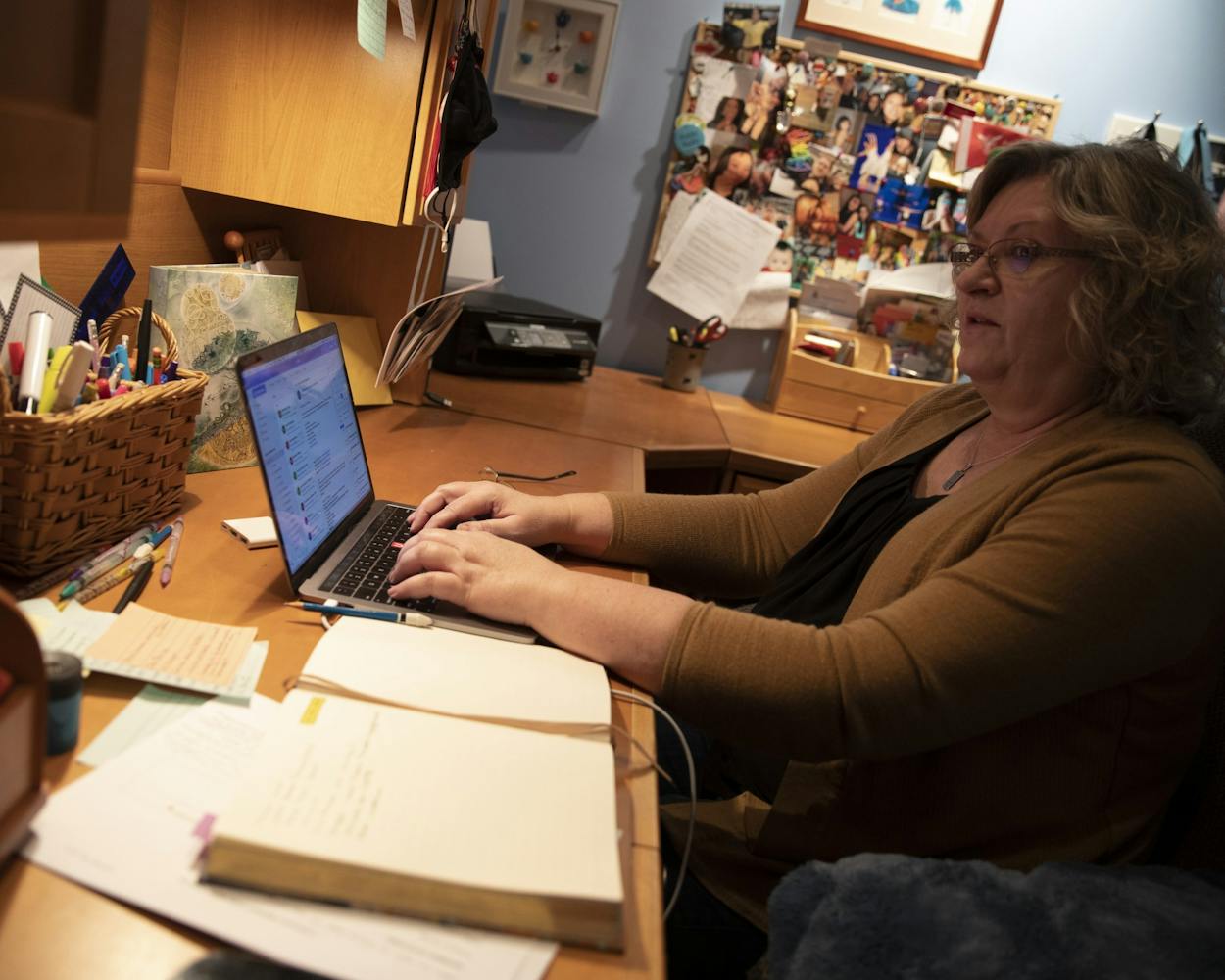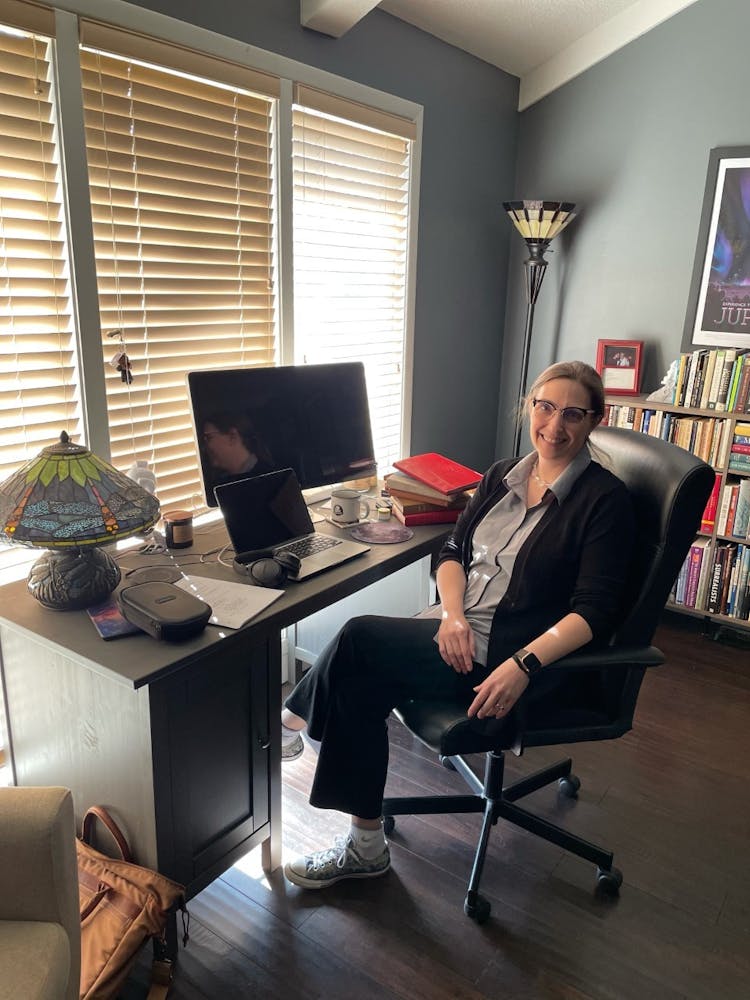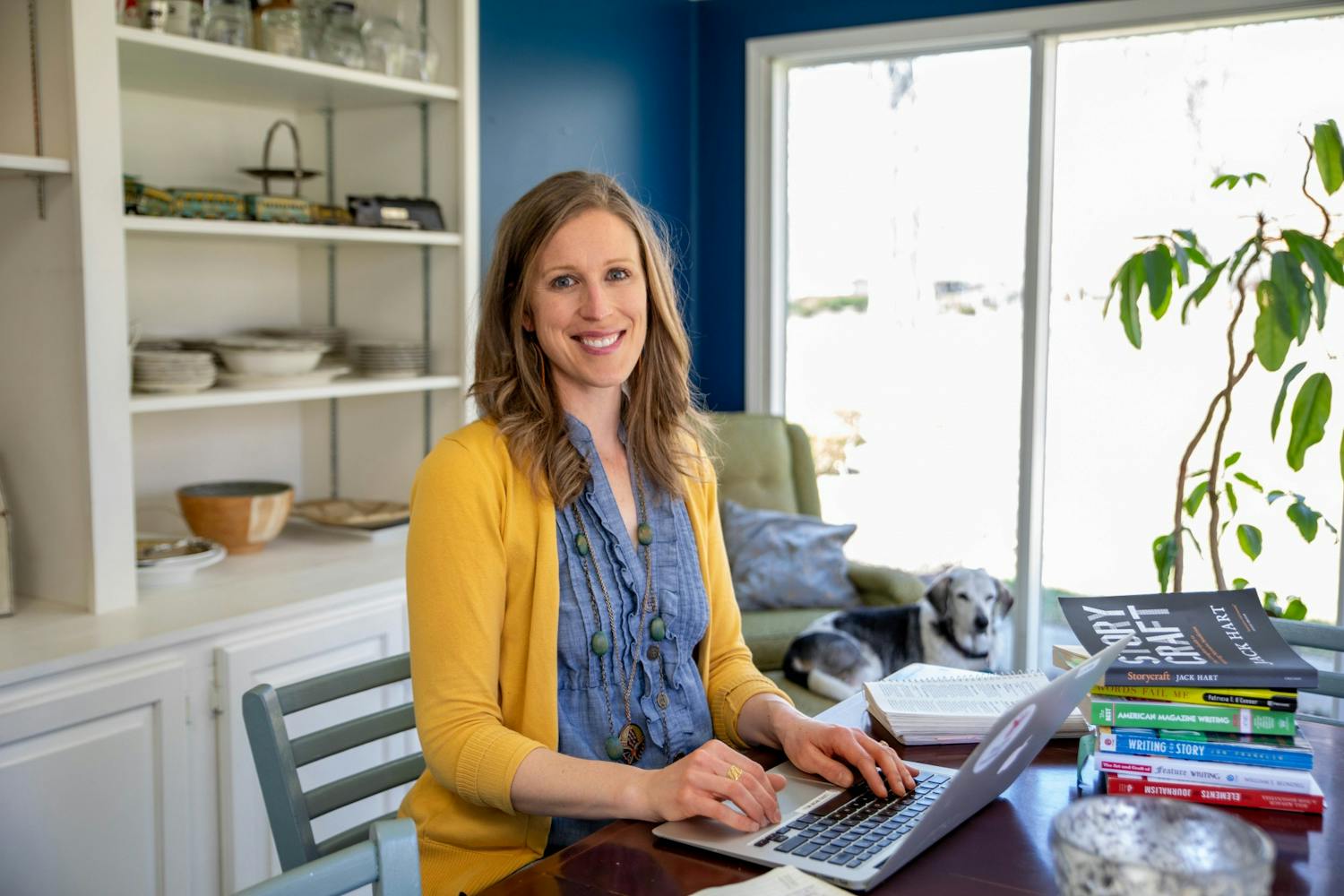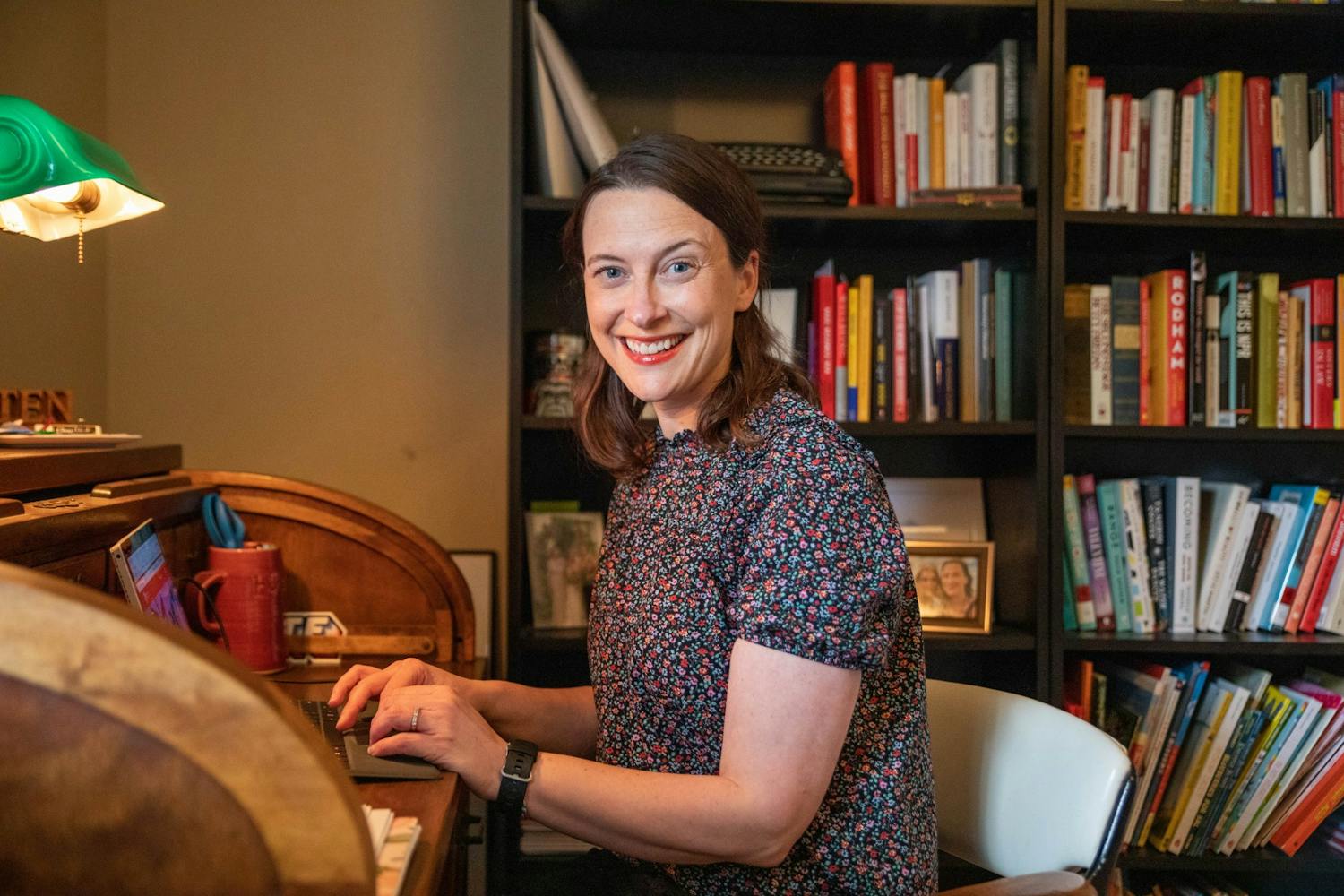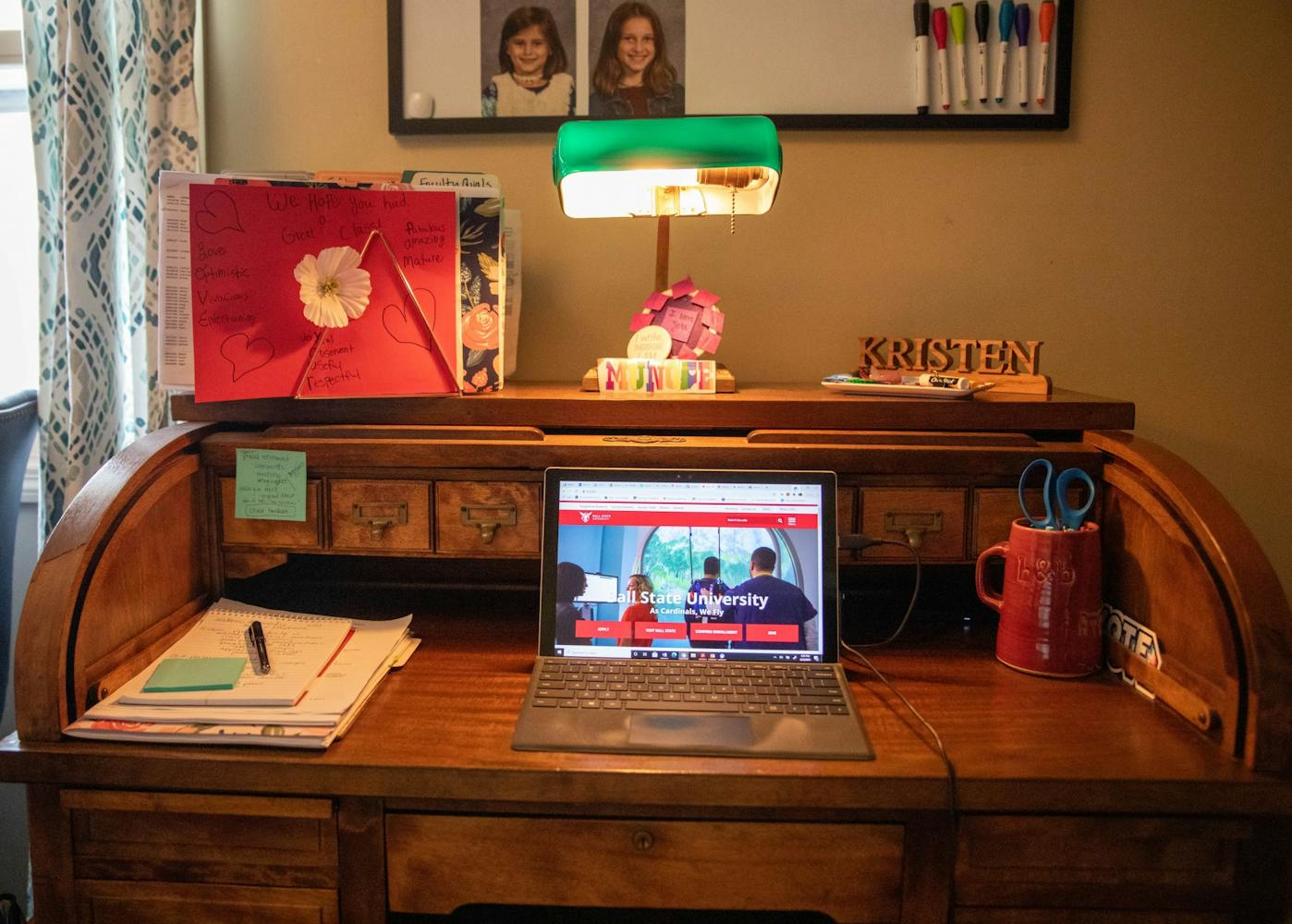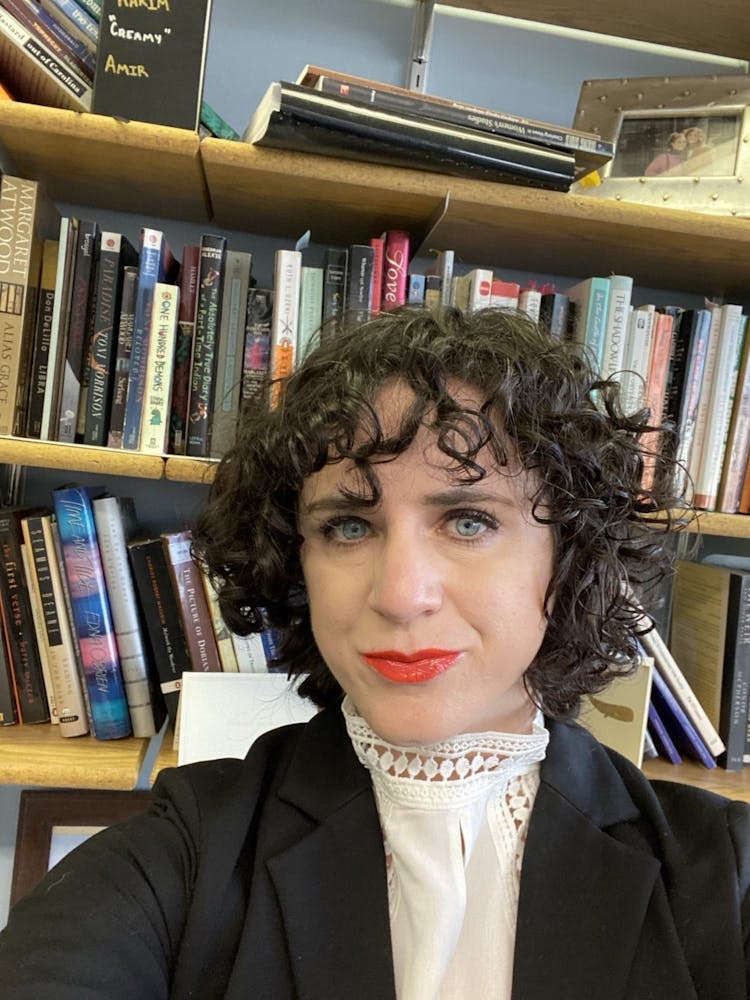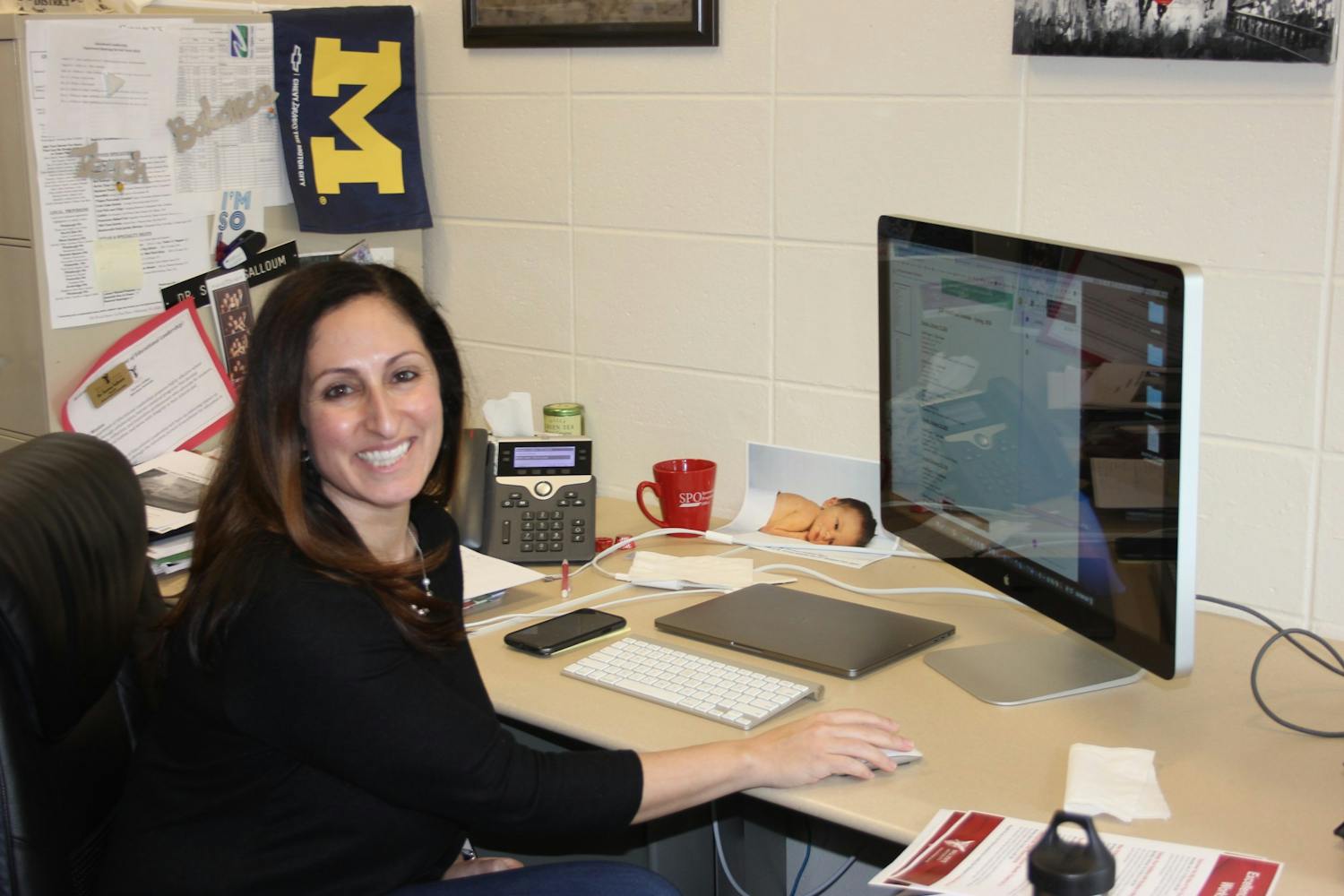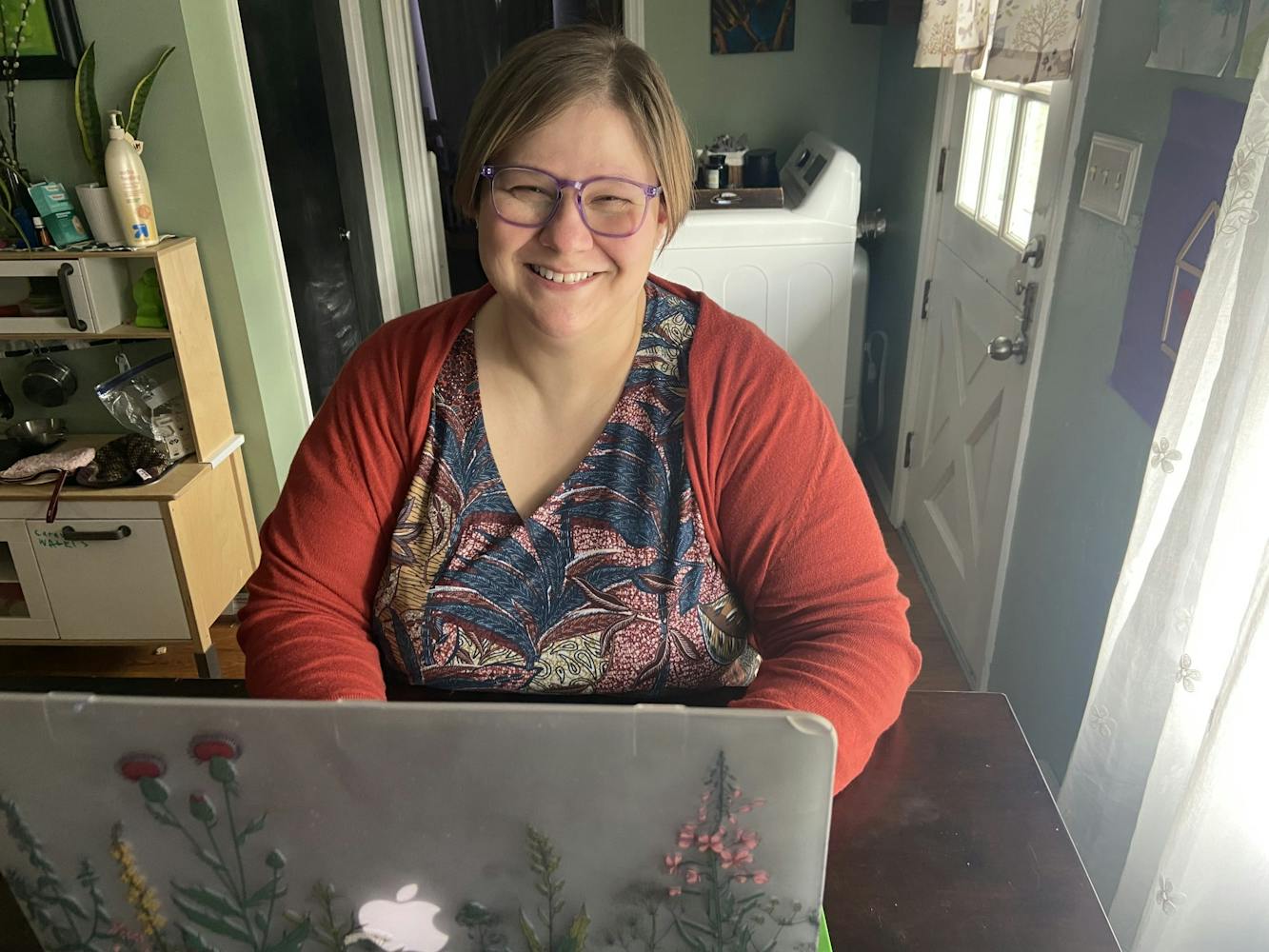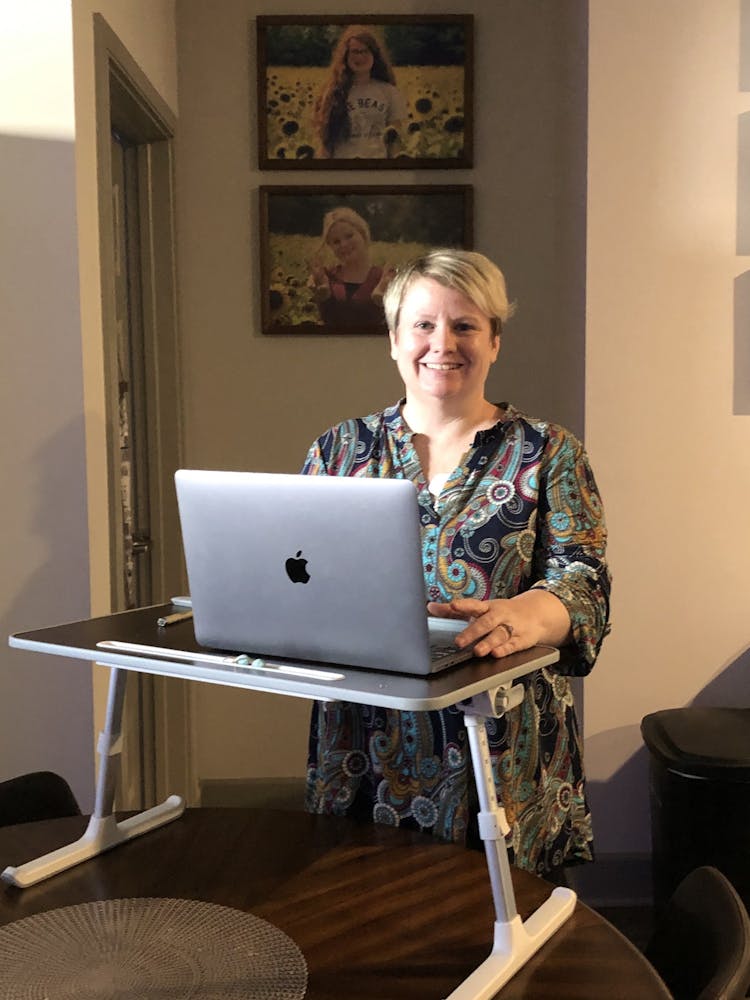Resources for stressed out parents
The New York Times’ Primal Scream Line allows parents to call 212-556-3800 and leave a voicemail where they can “yell, laugh, cry or vent for a solid minute. No judgment.”
The New York Times may use soundbites from the voice messages on its website but won’t publish any names without permission.
Source: The New York Times
Editor's Note: A previous version of this article incorrectly stated Kate Shively has worked fully remote since March 2020. It has been updated to include she begins practicum classes in person.
For Susan Tancock, there’s no such thing as work-life balance.
“To me, there’s only guilt,” she said. “You either feel guilt because you don’t work enough, or you feel guilty when you’re not spending enough time with your kids. It’s just balancing work-life guilt for me, and I think many women would tell you that same thing.”
Many working mothers at Ball State have additional obstacles to navigate during the COVID-19 pandemic, including helping their children with e-learning, deciding whether to send their kids to daycare and managing their own full-time jobs as professionals.
‘I feel much more connected to my kids’
Tancock, associate dean for Teachers College undergraduate and graduate studies and professor of elementary education, has two children in high school — Calla, 18, and Zanna, 14.
Tancock started teaching online classes in 2001 but said online teaching during the COVID-19 pandemic is different. With her children enrolled in fully remote learning, she’s more involved in their school assignments.
“I think I was less involved when they were going to school all the time, but now that we’re all [home], they can ask me for help on quizzing them for tests,” Tancock said.
Even though she isn’t teaching Ball State classes for the spring 2021 semester, Tancock still has administrative and research work to complete each day, which, she said, she’s more likely to take breaks from with her family home with her.
“I feel much more connected to my kids and my family when I’m home, and I’m more likely to take much-needed breaks and not eat at my desk,” she said. “That’s what I do when I’m on campus — I pretty much work nonstop for the eight hours that I’m there … I do take a real lunch break at home, and at work, I never do that.”
Tancock said she worked toward earning tenure while her children were younger and her husband, Chris, stayed at home to take care of their daughters.
“My husband was the stay-at-home person while I worked, but many families can’t make that choice, can’t give up a salary to have somebody be at home,” she said. “Childcare falls primarily on women, and I know I’m in a unique situation.”
Tancock said she personally felt supported by her family and her co-workers while working toward tenure.
“It’s very difficult for a woman on a tenure track to be able to work at that pace and feel as if she’s being a good mother,” she said. “It’s kind of like you have to choose whether to be a good mother or get tenure, unless you have a lot of support in place.”
Tancock said she remembers working from home with young children as a blessing with “another level of stress.”
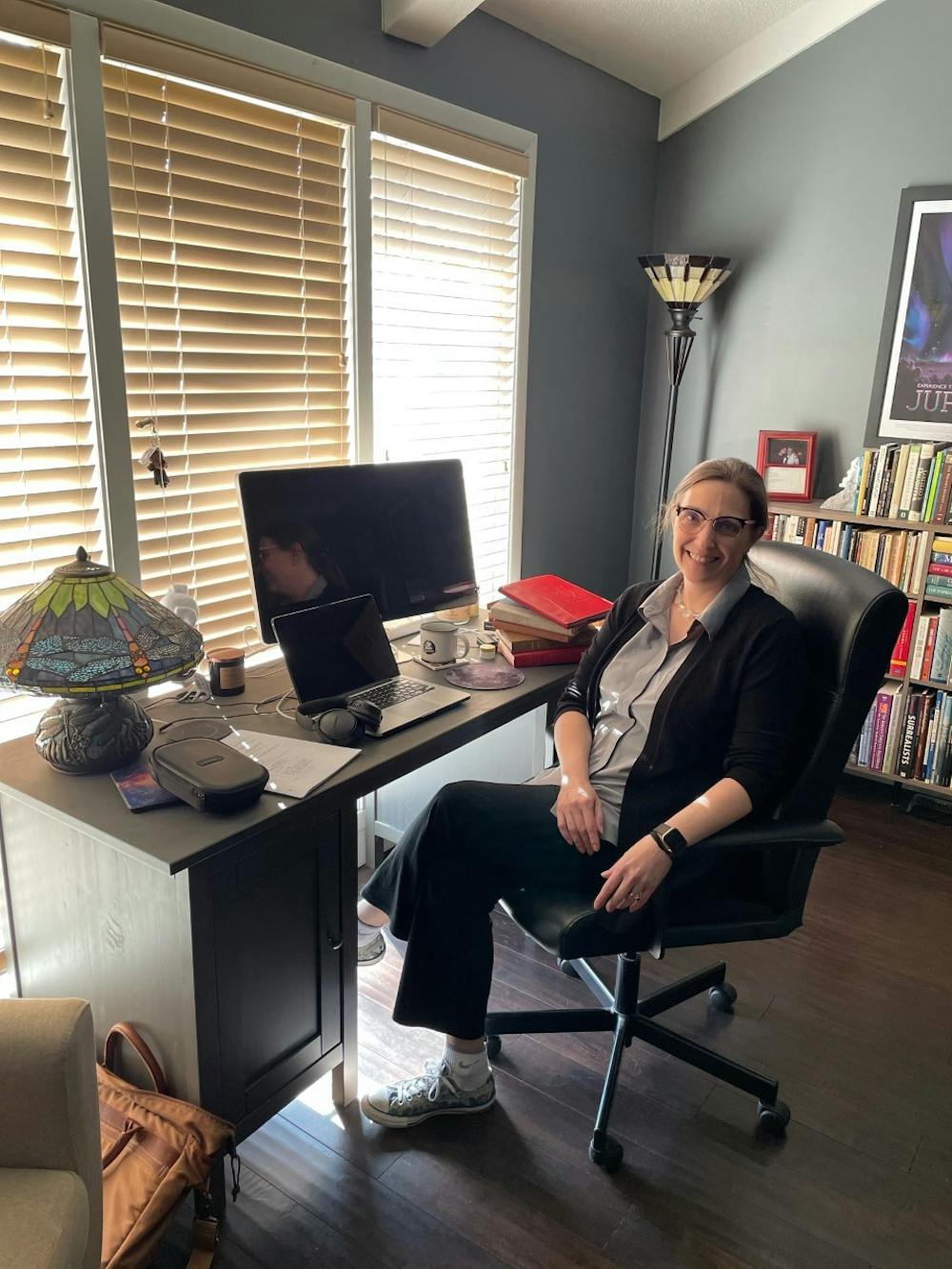
Jennifer Blackmer, director of the Virginia Ball Center (VBC) for Creative Inquiry and professor of theatre, smiles in her home office in Muncie, March 31, 2021. Blackmer has an office at the VBC and said she started coming back in person a few days a week in January 2021. Jennifer Blackmer, Photo Provided
‘I think 2020 was my year of epic momming’
Jennifer Blackmer, director of the Virginia Ball Center for Creative Inquiry (VBC) and professor of theatre, said the boundaries between her work and family life were blurred when she worked from home.
“I would say the advantages and disadvantages [of working from home] are pretty much the same thing,” she said. “If the kids had a problem with something, we were right there. My kids are amazing and fairly self-sufficient, but if they had a problem, they would want it to be fixed immediately.”
Blackmer said her kids — Ian, 18, Eleanor, 14, and Lucy, 13 — made a habit of writing notes on pieces of paper and holding them in front of her while she was in Zoom meetings.
“Sometimes the kids are like, ‘Well, Mom’s right there, she can do whatever we need her to do,’” she said. “During weekends or in a normal world, I would be willing to do whatever, but it’s hard to work and navigate their needs as well.”
Blackmer said she feels supported by her co-workers when they emphasize making space for each other to reflect on their personal mental health needs.
“We’ve all lost a lot, even if we haven’t lost loved ones,” she said. “We have lost access to our students, to our collegues, and in my instance, we’ve lost a lot of things that are the very reasons I got into teaching in the first place — being in the classroom.”
Blacker said she teaches playwriting classes, which the Department of Theatre and Dance shifted online for the fall 2020 and spring 2021 semesters. She said she comes to work for the VBC in person, but will still work from home occassionally.
“At home, there’s all kinds of temptations to not focus,” Blackmer said. “It is super hard, even in the best of times, to have a family and to work — to work at the level that everyone expects us to.”
Blackmer said her department and her supervisors are supportive of her being a working mother, but she still feels guilt for creating boundaries for herself.
“That was never anything that was explicitly said, it was just a feeling,” she said. “When you go to the office, life happens at home and you’re vaguely aware of it, but it’s not as present…I don’t know if there is any way for that to not be an issue.”
Blackmer said her husband, David, doesn’t work and she is grateful they can divide parenting responsibilities between the two of them. She said she is thankful to spend more time with her kids with creative outlets, like family game nights.
“I think 2020 was my year of epic momming just because of time and circumstance,” Blackmer said. “When my kids are there and they really need me, they will always be my priority.”
‘You can do it all’
Kristen Ramsey, assistant director and project manager of the VBC, said she usually comes to work in the office in person.
“I’m a single mom and I’m blessed that I can take care of myself and my kids by having this job,” she said.
Ramsey has two children — Mia, 16, and Madden, 12. She said both children are involved in travel sports and extracurricular activities. In March and April 2020, Ramsey said she enjoyed the break from sports that was necessary due to pandemic restrictions.
“When there were no sports or anything going on, it was kind of a nice break,” she said. “We did get to spend a lot more time together, and I really enjoyed that.”
Making time to attend her children’s sports games is something Ramsey said her supervisors have supported. She splits childcare responsibilities with her children’s father and relies on her own parents for support when they are available.
“This should show that you can do it all,” Ramsey said. “It might be tough, but you can do all of it. I always want to make sure that I express that to my daughter especially.”
Ramsey said the only disadvantage of having a full-time job and a family is her lack of time for personal hobbies, but she wants to emphasize spending time with her children right now.
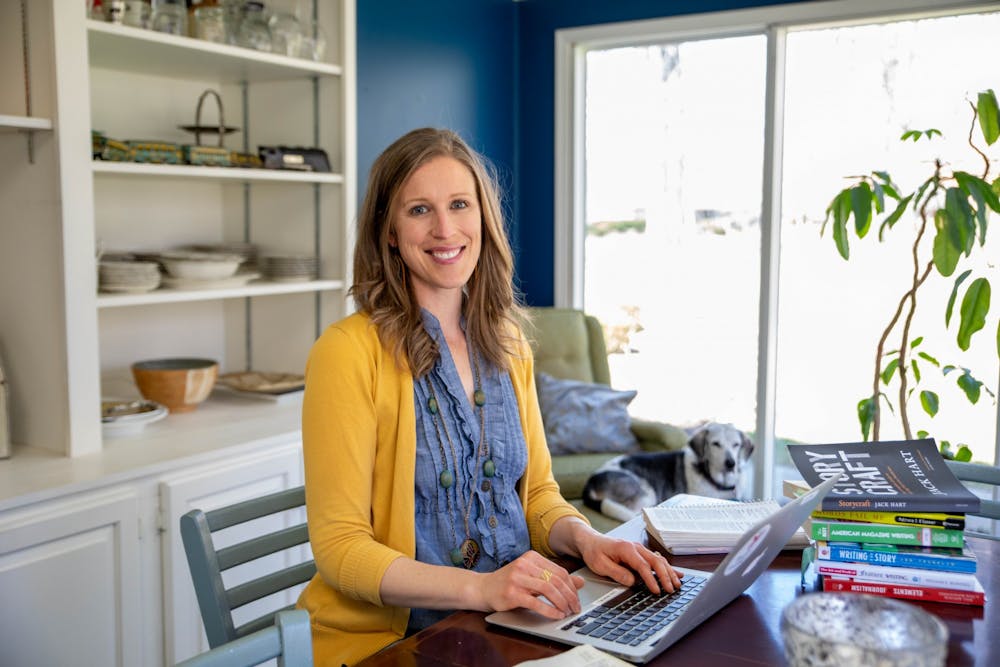
Kate Elliott, lecturer of journalism, poses for a photo in her sunroom March 19, 2021, in her home in Muncie. Elliott said she floats around her house while she works. Jaden Whiteman, DN
‘I’ll focus on myself later’
Kate Elliott, lecturer of journalism, said she is more productive on days she works from home. She teaches a virtual class Tuesdays and Thursdays and uses breaks in the day to do housework.
“In terms of efficiency, it’s nice to be like, ‘I teach this class, and I have 10 minutes,’ so I’ll throw in a load of laundry or eat something,” she said.
Elliott said she has worked full time with and without children and also has experience with full-time freelance work. She said choosing how she completes her work makes her feel empowered.
“I feel like I have had a taste of being a stay-at-home parent, being a full-time working mom and now teaching,” Elliot said. “All of these roles are equally so challenging and empowering.”
Elliott’s children — Rose, 9, and William, 6 — attend Westview Elementary School, where Elliott walks them every morning by 7:30. She picks her children up from school every day before 3 p.m.
“My dad passed away in 2013, and I was editor of the Ball State magazine at the time, and I was just working my tail off,” Elliott said. “I wasn’t seeing my kids as much as I wanted to, and teaching gives me the flexibility to do that.”
Although she is happy to have more time with her children, Elliott said she feels she doesn’t have a lot of time for herself.
“I still try to take good care of myself, but I’ve really, really focused this time in my life on work and being with my family,” Elliott said. “My kids are still young, and they still love me and want to be around me, so I feel like this is the time to [be with them], and I’ll focus on myself later.”
‘The days start a lot earlier and they end a lot later’
Jess Ward, assistant professor of biology, regularly worked from home before the COVID-19 pandemic began. She said she enjoyed working from home because it felt peaceful with fewer distractions than in the office.
With her two children, Eva, 8, and Ben, 6, participating in e-learning, Ward said her home and work lives were both disrupted by the pandemic.
“When we have the kids at home, we’re trying to navigate e-learning with them during the day and also manage our work,” she said.
Ward said having other family members at home with her causes distractions and she doesn’t feel as productive.
“I don’t go more than three minutes without having to do something or getting distracted from doing something…” Ward said. “Now, the days start a lot earlier and they end a lot later.”
When at home, Ward said she merges her work and home responsibilities and completes highest-priority tasks when they come up, whether it’s for her work or personal life.
Working full-time and being a mom has provided her with fulfillment and satisifaction, Ward said, because she’s able to do more with her life.
“I would mention, though, that it’s hard,” Ward said. “It’s easier to be empowered when there’s support available. It’s definitely something that I don’t think any woman wants to go through alone. It really takes a village.”
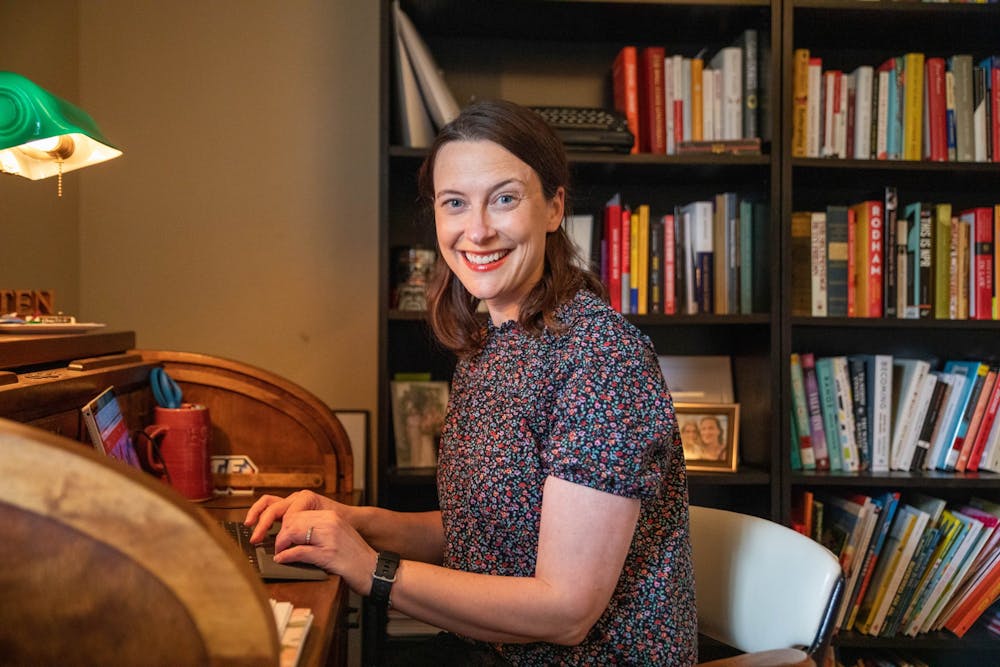
Kristen McCauliff, associate provost for faculty affairs and professional development, poses for a photo in her office March 23, 2021, in her home in Muncie. McCauliff said she spends the majority of her work day in her office. Jaden Whiteman, DN
‘It’s really hard to think’
Kristen McCauliff, associate provost for faculty affairs and professional development, works from home with a rigid schedule.
“I have a very traditional 8-5 schedule, which is unfortunate timing as a parent just because I really don’t have the flexibility of a faculty schedule,” McCauliff said.
McCauliff has had her administrative job since 2019, and she is also an associate professor of communication studies. Her daughters, Marlowe, 9, and Sloane, 7, attend Burris Laboratory School in person, but there are some times when they complete e-learning.
“There have been individual times where my daughters have been exhibiting different symptoms that could have been COVID-19-related, so I would have them at home while we waited for test results,” McCauliff said.
McCauliff said her daughters regularly attended daycare in previous years, but her family didn’t want to send them this year because of COVID-19 concerns.
“I know everybody was working hard to keep [daycare] safe, but we chose not to do the aftercare, and the only reason we could do that is because of my mom,” McCauliff said.
McCauliff said her mother retired about two years ago and started to spend more time with her granddaughters when they felt safe around each other taking pandemic precautions.
When McCauliff feared her children might have been exposed to the coronavirus were some of her more stressful days. In those cases, she said, their household’s “third parent” — a Google Home smart speaker — would narrate her daughters’ schedule and instruct them when to practice instruments, complete assignments and other activities in the family’s calendar. She and her husband, Drew, would also occasionally take days off.
“I feel immense privilege that my husband and I have days off that we can use,” McCauliff said. “Especially when our kids were home learning for those two weeks here and there or few days, every spare minute of my working day was either spent in a meeting, teaching or with my kids trying to get their day going. I missed every single minute where I would typically send an email.”
Despite her busy schedule and often working on job responsibilities after her children went to bed, McCauliff said her daughters have been understanding during the pandemic.
“My kids are wonderful,” McCauliff said. “My daughters made me a little sign for my door that says, ‘You can come in, the meeting I’m on is not important,’ and I can flip it, and it says, ‘Do not disturb, I am working.’ They have that awareness, which I’m so grateful for, and I was so proud of them, but I was also kind of sad.”
Especially in the earlier months of the pandemic, McCauliff said, it was difficult to juggle her work responsibilities and worries about her family.
“It’s really hard to think, and academics are paid to think,” she said. “My brain felt full of noise, of details, of scheduling, of concerns. I was stressed all the time.”
Now, McCauliff said, she feels slightly better and hopeful for the future as she looks forward to Ball State returning to more in-person instruction for the fall 2021 semester.
“I don’t think it’s bad that my kids know that I work and that I love my job,” she said. “I actually think that’s an instructive life lesson … I love that there were times when I was teaching my graduate class about feminism when my kids could hear me. I think it’s good that they can see me as a professional who’s proud of my job.”

Molly Ferguson, associate professor of English, takes a selfie in her Ball State campus office in the fall 2020 semester. Ferguson teaches in-person classes Tuesdays and Thursdays and will often come to her office to research during other days of the week. Molly Ferguson, Photo Provided
‘I’ve never worked so hard in my life’
Molly Ferguson, associate professor of English, said she used to come to campus only on the days she taught classes and would work from home or from coffee shops during the days she needed to research.
Now, Feguson said she often comes to her office to work five days a week because she feels it is safer during the pandemic than spending time in coffee shops.
Ferguson’s two children, Liam, 13, and Teagan, 9, both attend Burris Laboratory School. Feguson said she drives directly to campus after dropping her kids off at school and teaches classes until 3:15 p.m. Tuesdays and Thursdays. After her classes, she meets Liam outside and picks up Teagan from aftercare.
She said Burris aftercare staff brings students outside often and abides by social distancing guidelines to minimize the risk of children contracting COVID-19. Ferguson said because of her teaching schedule, “it was not an option not to use [aftercare].”
She said she was on sabbatical in the spring 2020 semester when the pandemic required her children’s schooling shift online, so Ferguson was able to help with her children’s schoolwork. She said she is grateful for having a flexible schedule, but there are still challenges, especially when it comes to her detail-oriented work.
“You can’t be writing when people are talking, chasing the dog and asking you questions,” she said. “[The pandemic] has really slowed downed my research aspirations.”
Feguson said the classes she teaches use a hybrid model, with half of the class attending Tuesdays and the other half Thursdays. When half of her students aren’t in the classroom, Ferguson said she has to create assignments.
“That’s where the workload has really increased,” she said. “They’re doing something new every class, but it’s something that has to get graded, and I have to check that they’re understanding it. I’ve never worked so hard in my life.”
Ferguson said juggling her faculty responsibilities with raising her kids is difficult and not something she would ask of other people.
“If you’d asked me a year ago if I could do it, I would have said ‘no,’ but I can, so I guess that’s empowering,” she said. “I wouldn’t say this is any kind of success story or anything I would ask anyone to try to replicate.”
Ferguson said she is hopeful employers might offer ways to support women in their communities after realizing they don’t always get recognized for their work.
“I think women are really having to prioritize other people instead of their own careers and work,” she said. “The systems don’t always value that we have multifaceted lives.”
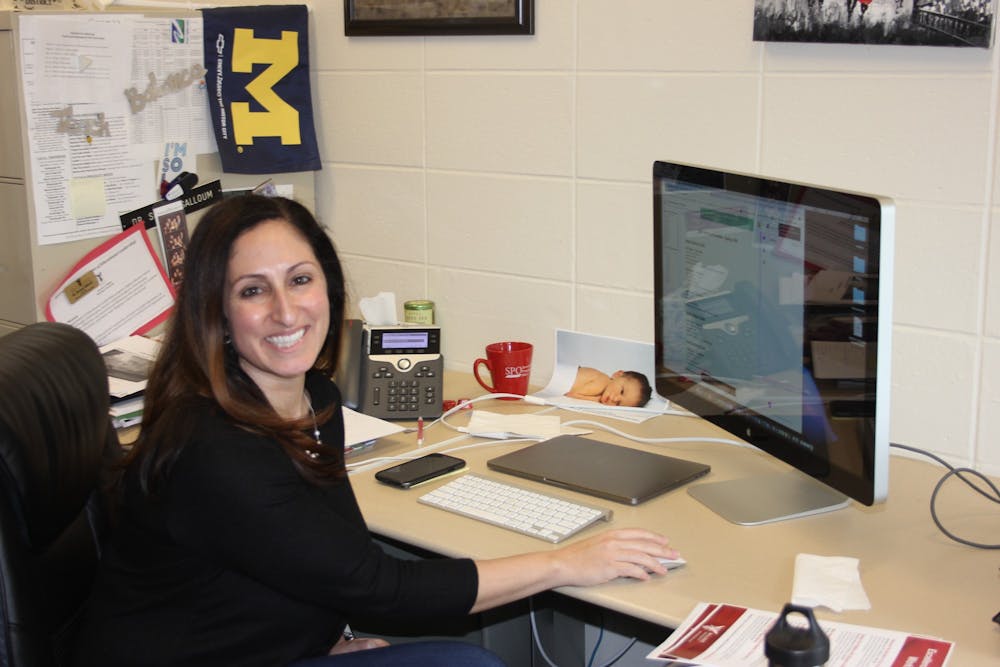
Serena Salloum, associate professor of educational leadership, sits at her desk in the Teachers College Feb. 11, 2020. Salloum said she would come to campus an average of twice a week before the COVID-19 pandemic. Serena Salloum, Photo Provided
‘I feel really happy and proud of myself’
Serena Salloum, associate professor of educational leadership, has mostly worked from home since she was a doctoral student at the University of Michigan.
Salloum has two kids — Teddy, 4, and Lucy, 2. She said Teddy goes to preschool for four half-days each week, and her family’s nanny, Katy Rosenbaum, takes care of both children during the day.
“I know they’re doing all this awesome stuff while I’m working, and I feel good about that,” Salloum said. “I think that’s true for any mom — you have to feel good about where your kids are, wherever the setting might be.”
Salloum said she enjoys working from home because she is able to spend more time with her children, but it is also easier to get distracted.
“I think any time I leave my office, it’s a disruption to the kids,” she said. “That’s one of the best things about being home is that I do get to have lunch with them and see them, but it’s complicated for our childcare provider because she has to reign them back in.”
When Salloum knows she will need a quiet house for a meeting, she will schedule it during her children’s afternoon naptime.
“I think everything is a constant juggle, but I’m so grateful that I can still make this work because I know so many folks are out of work during the pandemic,” she said.
To stay organized, Salloum said she uses online scheduling tools and to-do lists. Every day, she aims to accomplish three goals: exercise, write and make dinner for her family.
“If I achieve those three goals in any day, I feel really happy and proud of myself,” she said. “They sound really simple, but it’s something for myself, something to take care of my family and taking care of myself professionally. I feel empowered when I’m able to make that happen.”
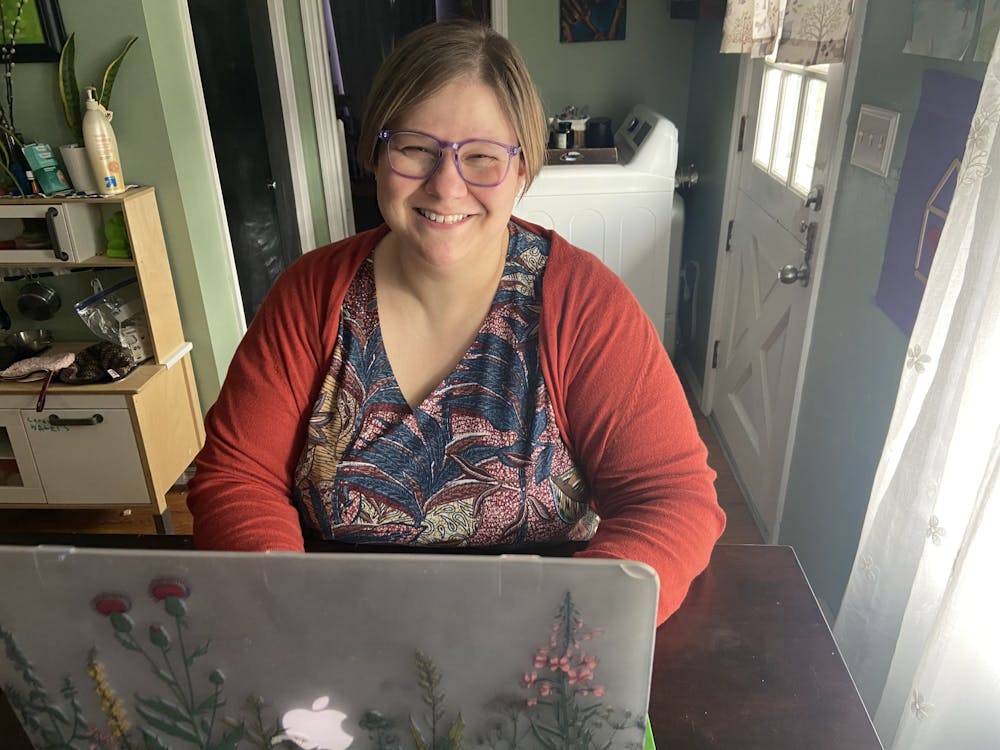
Paige Waters, associate teaching professor of telecommunications, works in her home March 24, 2021, in Muncie. Waters said her home desk became her daughter's for virtual learning, so Waters works from her kitchen. Paige Waters, Photo Provided
‘Then I start all over the next day’
Years before the COVID-19 pandemic began, Paige Waters, associate teaching professor of telecommunications, said she thought working from home would be beneficial for her.
“Two years ago I remember thinking to myself, ‘if I could work from home, I could get work stuff done and home stuff done. I could do meal prep and keep the laundry up,’” Water said. “I don’t know who that idiot was who thought that or why she thought that, because it’s not possible.”
Waters works from home with her two children, Sarah, 7, and Charles, 14 months. She said Sarah is completing her school work from home and Waters likes knowing what her daughters’ assignments are like.
“The challenges are that I’m working from home with a 7 year old and a 14 month old,” Waters said. “Those are like three separate jobs — kids’ school stuff, watching a 14 month old and doing teaching, plus managing a household. Those are all separate jobs you could pay people to do and I’m trying to do them all at once.”
For Waters, one benefit of working from home is not having to pay for daycare. She said Charles runs around in a playpen while she works from her kitchen and watches him. During Department of Journalism faculty meetings, she often multitasks.
“Half of my meetings and workshops, I’ve got my kid next to me in his highchair and I’m feeding him yogurt and nobody cares, they’ll wave and say ‘hi,’” Waters said. “It’s very warm and welcoming and I couldn’t imagine trying to do this in a different environment.”
After she puts her kids to bed, Waters catches up on work responsibilities from earlier in the day.
“I actually can sit down and work until I can’t do it anymore,” she said. “Then I start all over the next day.”
Waters has to remember to give herself grace while trying to manage different jobs.
“I just have to remind myself that you can’t grade assignments and do the dishes,” she said. “You can do one of those things.”

Kate Shively, assistant professor of elementary education, smiles for a photo March 31, 2021, in her home in Zionsville, Indiana. She said her workspace is in the middle of her apartment. Kate Shively, Photo Provided
‘I think I’ve struck a balance somewhere’
Kate Shively, assistant professor of elementary education, worked in a hybrid fashion before the pandemic — teaching classes on campus Mondays, Wednesdays and Fridays, and researching from home Tuesdays and Thursdays.
Since March 2020, Shively said she has worked mostly remotely, as the practicum she teaches transitioned to a virtual format once students were assigned to online classrooms as student teachers. Her daughters, Samantha, 17, and Olivia, 15, attend Indiana Connections Academy online.
When her daughters need help with assignments, Shively said she schedules time for them on her Outlook calendar, especially for larger projects like helping them write papers.
“That takes some dedicated time and I want to make sure I block that time and protect it for them,” she said.
Though Shively said working from home comes with its own challenges, like easily getting distracted, she is thankful to spend more time with her daughters. Before the COVID-19 pandemic, Shively said there were mornings when she would leave her house in Zionsville, Indiana at 6:30 a.m. and not return until after her daughters and husband had eaten dinner.
“Now, the advantages are I get to see them,” Shively said. “We had to set up our boundaries, but I still get to see them and we get to have lunch.”
One aspect of her work-life balance she is working to improve is remembering to take breaks. Organizing her tasks by categories — family, teaching, research and administrative work — is one scheduling technique Shively uses to manage her responsibilities.
“All emails and tasks get placed in daily folders, seven folders named by the day of the week,” she said. “My email has that system and my desktop has that system. That way, I know what I’m focusing on each day of the week and it doesn’t look so overwhelming.”
As Shively is working toward tenure and sometimes has to work at the dinner table with her family, she said she wondered if her children wished she worked less.
“I asked my girls early last summer or spring what their opinion was of me working so much and not always being available,” Shively said. “They told me ‘Mom, you’ve shown us what it looks like to work from home, and away from home [and] you’ve shown us what it’s like to juggle multiple jobs.’ So they feel that it’s shown them what they are able to do.”
Empowering her daughters through what her professional life looks like is something Shively said makes her proud.
“It looks messy and it can be crazy, hectic and stressful,” she said, “but when it comes down to it, if my kids are saying, ‘I want to have a career someday because I’ve seen what you’ve been able to do,’ then I think I’ve struck a balance somewhere.”
Contact Grace McCormick with comments at grmccormick@bsu.edu or on Twitter @graceMc564. Contact Maya Wilkins with comments at mrwilkins@bsu.edu or on Twitter @mayawilkinss.

